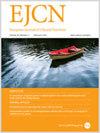Adherence to the Mediterranean diet and risk of anxiety and depression in people with obesity: a cross-sectional analysis
IF 3.3
3区 医学
Q2 NUTRITION & DIETETICS
引用次数: 0
Abstract
Anxiety and depression are common mental disorders worldwide, in particular in people with obesity. Adherence to the Mediterranean diet has been found beneficial for the prevention of anxiety and depression in the general population. We aimed to evaluate this association in a large cohort of people with obesity. A cross-sectional study of 4957 patients with obesity (63.1% women, median age 49 years, IQR 40–58 years and BMI 33.6 kg/m2, IQR 31.6–36.9 kg/m2) was carried out. Clinical history, anthropometric measurements and lifestyle-related information were investigated. A 14-item MEDAS questionnaire was used to assess adherence to the Mediterranean diet. The 20-item STAI2 questionnaire and the 24-item QD questionnaire were used to assess the presence of anxious and depressive symptoms, respectively. Clinical cases of anxiety and depression were identified among patients with a physician-made diagnosis of anxiety and depression or with STAI2 and QD score ≥95th percentiles of reference population. Overall, 11.9% of participants were positive for anxiety and 11% for depression. Multivariate linear regression models showed a decrease in STAI2 and QD scores of 0.18 points (95%CI: −0.33, −0.03) and 0.10 points (95%CI: −0.16, −0.03), respectively, for each 1-point increase in MEDAS score. The multivariate logistic regression model showed a 7% reduction in the odds of anxiety and depression for each 1-point MEDAS increase (OR = 0.93, 95%CI: 0.89, 0.99; OR = 0.93, 95%CI: 0.88, 0.98). Mediterranean diet is associated with a lower risk of anxiety and depression in people with obesity. Longitudinal studies are needed to determine causality.

坚持地中海饮食与肥胖症患者患焦虑症和抑郁症的风险:横断面分析。
背景/目的:焦虑症和抑郁症是世界范围内常见的精神疾病,肥胖症患者尤其如此。在普通人群中,坚持地中海饮食有利于预防焦虑症和抑郁症。我们的目的是在一大批肥胖症患者中评估这种关联:我们对 4957 名肥胖症患者(63.1% 为女性,中位年龄为 49 岁,IQR 为 40-58 岁,BMI 为 33.6 kg/m2,IQR 为 31.6-36.9 kg/m2)进行了横断面研究。对临床病史、人体测量和生活方式相关信息进行了调查。14 项 MEDAS 问卷用于评估地中海饮食的坚持情况。20 项 STAI2 问卷和 24 项 QD 问卷分别用于评估是否存在焦虑和抑郁症状。焦虑症和抑郁症的临床病例从经医生诊断为焦虑症和抑郁症或STAI2和QD得分≥参考人群第95百分位数的患者中确定:总体而言,11.9%的参与者焦虑症阳性,11%的参与者抑郁症阳性。多变量线性回归模型显示,MEDAS得分每增加1分,STAI2和QD得分分别下降0.18分(95%CI:-0.33,-0.03)和0.10分(95%CI:-0.16,-0.03)。多变量逻辑回归模型显示,MEDAS 每增加 1 分,焦虑和抑郁的几率就会降低 7%(OR = 0.93,95%CI:0.89,0.99;OR = 0.93,95%CI:0.88,0.98):结论:地中海饮食与肥胖症患者焦虑和抑郁风险降低有关。需要进行纵向研究以确定因果关系。
本文章由计算机程序翻译,如有差异,请以英文原文为准。
求助全文
约1分钟内获得全文
求助全文
来源期刊
CiteScore
10.60
自引率
2.10%
发文量
189
审稿时长
3-6 weeks
期刊介绍:
The European Journal of Clinical Nutrition (EJCN) is an international, peer-reviewed journal covering all aspects of human and clinical nutrition. The journal welcomes original research, reviews, case reports and brief communications based on clinical, metabolic and epidemiological studies that describe methodologies, mechanisms, associations and benefits of nutritional interventions for clinical disease and health promotion.
Topics of interest include but are not limited to:
Nutrition and Health (including climate and ecological aspects)
Metabolism & Metabolomics
Genomics and personalized strategies in nutrition
Nutrition during the early life cycle
Health issues and nutrition in the elderly
Phenotyping in clinical nutrition
Nutrition in acute and chronic diseases
The double burden of ''malnutrition'': Under-nutrition and Obesity
Prevention of Non Communicable Diseases (NCD)

 求助内容:
求助内容: 应助结果提醒方式:
应助结果提醒方式:


